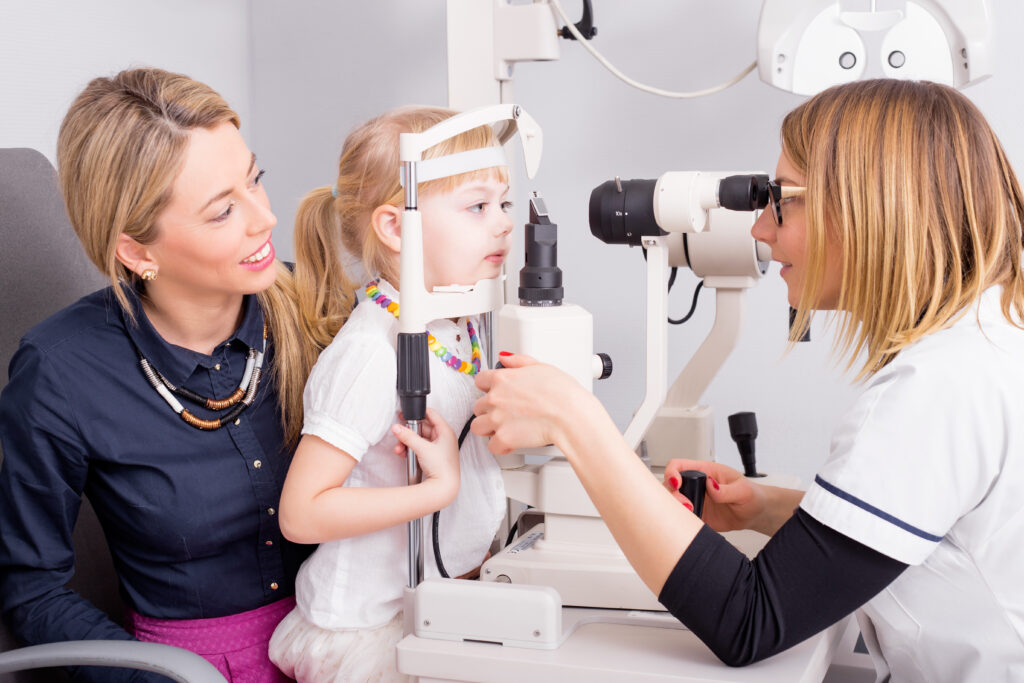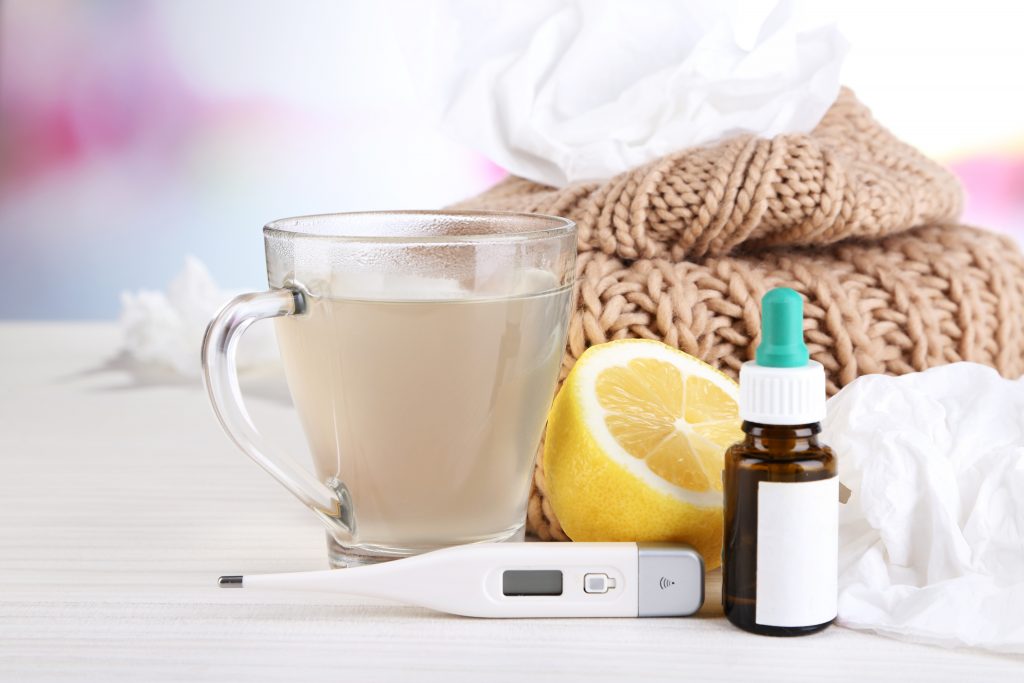News
Healthy Vision Awareness Month
Simple things, like looking at your phone to check your Facebook, catching a movie with a friend, or flipping through a photo album of old pictures, would not be possible if we didn’t have healthy vision. It’s so easy to take things for granted until you lose them. May is Healthy Vision Month where we are reminded of the importance of healthy vision. There are about 1.3 billion people living with some form of vision impairment according to the World Health Organization. About 80 percent of those impairments are considered avoidable. Taking care of your eyes should be treated with the level of care you put into eating healthy and being physically active. Consult an eye care professional and follow a few tips to help you reduce your chances of vision loss. Your future self will thank you.
What Are the Signs You Need to See an Eye Care Professional Immediately?
- Decreased vision
- Eye pain
- Drainage or redness of the eye
- Double vision
- Diabetes
- Floaters (tiny specks that appear to float before your eyes)
- Circles (halos) around light sources
- If you see flashes of light
How Can You Protect Your Vision?
Get Regular Comprehensive Dilated Eye Exams
Your eye doctor can detect any eye problems early if you pay attention to the warning signs and make sure you visit your eye doctor regularly. Serious eye diseases such as glaucoma and age-related macular degeneration (AMD) are more easily treated if caught early. Make sure to research your family’s eye health history. You may be at an increased risk so it’s important to know if anyone has been diagnosed with an eye disease or condition since some are hereditary.
Maintain a Healthy Lifestyle
Many eye diseases are linked to other health problems, including high blood pressure, diabetes and high cholesterol levels. Maintaining a healthy lifestyle is important to not only your overall physical health but especially your eyes. Start adding more superfoods into your diet such as tuna, blueberries, dark chocolate, spinach, eggs, oysters, oranges and carrots to name a few. Exercise can also help reduce the risk of health problems. Incorporate frequent physical activity into your routine as much as possible a steer away from smoking tobacco. Research has shown that people who smoke tobacco are at a higher risk of developing cataracts, AMD, diabetic retinopathy and more.
Wear Protective Eyewear
If you work in an environment that involves an activity that can be potentially harmful to your eyes, make sure to wear protective eyewear and take extra safety precautions. Also, wear protective eyewear when playing sports or doing activities around the home, such as painting, yard work, and home repairs. When shopping for sunglasses, choose ones that block 99 percent to 100 percent of ultraviolet A (UVA) and ultraviolet B (UVB) radiation. These will help prevent retinal damage along with protecting the delicate eyelid skin from both wrinkles and skin cancer around the eye, both cancerous and non-cancerous growths on the eye.
Contact Lens Care
It is easy to abuse contact lens, avoiding the following mistakes, you will save yourself from some serious eye damage such as corneal ulcers, severe pain, and even vision loss. Take extra precautions by avoiding the following:
- Putting in or taking out your contact lens without washing your hands
- Sleeping in contact lens that are not approved for overnight wear
- Using saliva or water as a cleansing or wetting solution
- Using expired solution
- Using disposable contact lens beyond their wear
Give Your Eyes a Rest
This is especially a good idea if you have a job where you’re looking at a screen for long periods of time. Use the 20-20-20 rule: look up from your work every twenty minutes at an object twenty feet away for twenty seconds.
Healthy vision requires you and your family to take safety precautions, maintain a healthy lifestyle, become knowledgeable about the warning signs of serious eye problems or family eye history, and lastly visit your eye doctor often. Remember 80 percent of impairments are considered avoidable so be proactive to protect you and your family.
In the event of any health emergencies, Golden Triangle Emergency Center is here for you. Our concierge-level care for all ages is available 24/7 for local patients, and our doctors are ready to serve. When your family needs it most, we offer only the very best.
Nutex Health, Inc supports you and your family’s health. You can depend on Golden Triangle Emergency Center or any one of our concierge-level, freestanding emergency facilities to deliver the emergency care you deserve, 24 hours a day, 365 days a year.
Orange Celebrates a 4-Year Anniversary
Golden Triangle Emergency Center is celebrating four-years of providing the city of Orange with top quality emergency medical care, a service made all the more crucial after the closure of the emergency wing of Baptist Orange Hospital at the beginning of 2017. We would like to thank the community for their use of the facility and belief in our medical team. We would not have made it four years without this communities’ support.
In the four years that Golden Triangle Emergency Center-Orange has been proud to serve the community with charity programs, school presentations, and assistance with emergency relief efforts in the wake of the Deweyville flood and Hurricane Harvey. Each Year GTEC-Orange also provides scholarships for RN and LVN students from Lamar State College Orange. GTEC was recognized and awarded the Greater Orange Area Chamber of Commerce Business Community Service of the Year Award in 2016 for their commitment and service to the community. Even when our own facility flooded during Hurricane Harvey, we were back on our feet after only one month, serving our community when they needed it most.
Golden Triangle Emergency Center-Orange is located at 3107 Edgar Brown Dr. Orange, TX 77630 in a state-of-the-art 7,000+ square foot building with on-site imaging and laboratory facility and a full range of clinical services as well as occupational oversight. We have an amazing staff and pride ourselves on patient care that starts at the top in our Medical Director, Brad Barton.
Golden Triangle Emergency Center provides concierge-level care to our local communities with state-of-the-art facilities, short wait times, and steadfast commitment to patient care. GTEC is open 24 hours a day, seven days a week and treats all major and minor health emergencies. Golden Triangle Emergency Center sets the Gold Standard in emergency and industrial care. Only the Best Emergency Care for your family.
There will be no formal event but, please feel free to come out and take a tour of our beautiful facility, or contact Kari Busch, Director of Marketing, for more information at: 409-920-4470 or kbusch@gtec24.com.
Women’s Health Concerns
In a month marked by Women’s History and International Women’s Day, the health of women in the family come to the forefront of many people’s minds. Whether you’re thinking about mothers, grandmothers, aunts, sisters, daughters, or even your health, there are certain conditions and concerns that are important for women to think about. To help all of the women in our community be aware of their unique health needs, Golden Triangle Emergency Center wants to discuss these risks.
Circulatory Conditions
While things like heart attacks and strokes are some of the leading causes of death in both men and women, these conditions are more likely to be fatal for women. In the case of heart attacks, women are more likely to die directly from them, since their symptoms can often manifest slowly or go unnoticed. Strokes, on the other hand, are more likely to occur in women due to factors involving hormonal changes which can occur before and after pregnancy, as well as post-menopausal hormonal shifts.
To help monitor and mitigate these conditions, it is important for women to talk to their doctors about any health and hereditary risks concerning heart attacks and strokes. Taking the right steps to maintain a healthy lifestyle early can go a long way towards preventing these serious conditions later in life.
Mental Illnesses
As awareness of conditions like depression, anxiety, and other mental health issues increases, so have the studies concerning who suffers from them the most. According to a 2016 publication by The Lancet, women are twice as likely to develop depression in their lifetime than men are. This can be due to a variety of genetic and environmental factors, but one of those factors often has to do with stress.
Women have generally higher stress levels, according to surveys conducted by the American Psychological Association. Stress levels in women have tended to go up in recent years, and this can contribute to mental illnesses, as well as physical health conditions. It makes monitoring stress important for women in every family. Women need to be able to speak up about their stress levels and seek help when necessary, even if that means from a counselor or a psychiatrist.
Bone Strength
It’s no secret that conditions like osteoporosis tend to occur more often in women, but did you know that women are also more likely to suffer from arthritis? Both of these conditions, which are tied into the strength of bones and tendons over time, affect many women later in life.
To help combat this natural weakening of the bones, women should make an extra effort to be mindful of their bone health. Incorporate multivitamins and bone-strengthening foods into your diet and engage in consistent weight-training exercises. Even very light weight lifting with small dumbbells can help to strengthen joints and bones early in life and set the building blocks for a strong body later down the line.
Golden Triangle Emergency Center encourages all of the wonderful women in our community to consider their health. A woman’s health and longevity are more than just annual check-ups. Women should talk with their doctors about any family history of concerns they have concerning heart health, bone health, and even mental illness. In the case of any medical emergencies, then our staff of highly-trained doctors and nurses are on call 24/7 to give you the compassionate care you deserve.
Nutex Health, Inc supports you and your family’s health. You can depend on Golden Triangle Emergency Center or any one of our concierge-level, freestanding emergency facilities to deliver the emergency care you deserve, 24 hours a day, 365 days a year.
New Employees of the Year
This blog is written by Kari Busch.
Golden Triangle Emergency Center gives an annual Employee of the Year Award per facility. To receive this distinguished award, we look for employees who go above and beyond their job requirements. These individuals are always looking for a way to better themselves, the people around them and this company. These individuals have done just that.

Golden Triangle Emergency Center Port Arthur would like to congratulation Michelle Dixon on being their Employee of the Year. She is Lead Patient Representative and her job entails: quality patient care, overseeing of front desk employees, scheduling, lead meetings for front desk, custodial of medical records, patient advocate, calculate payment information and accept funds, hiring, and input patient information. Michelle has been with the company since July 2014. She goes above and beyond for this company to make other employees and patients happy and taken care of to her best ability.
Michelle is a Mom of two boys and has 4 amazing little grand babies. She likes to socialize, spend time with her family, relaxing, listening to music, dancing and working with her work family. Michelle graduated from Abraham Lincoln High School in Port Arthur and went on to college at Lamar Port Arthur. She is the founder and president of Ebony Misses Social Club who spend time helping out in the community and doing events with other women.

Golden Triangle Emergency Center Orange would like to congratulation Jenna Mueller on being their employee of the year. By trade Jenna is a paramedic and at GTEC her job entails: quality patient care, lab lead, medication administration, diagnostic testing, and making sure everyone is prepared to do their job by creating packets and making sure everything is up to date. Jenna has been with the company Since October 2014 and just accepted the position of lab lead in January this year. She goes above and beyond for this company to make other employees and patients happy and taken care of. Jenna is a big promoter of Golden Triangle Emergency Center and just recently became a certified CPR instructor.
Jenna is a Mom of two beautiful little girls and has been married to her husband Mark for 5 years. Mark is a Fireman for Port Arthur and they met on a wreck scene. She is a chicken mom and likes to do crafting, go bike riding and pulling her kids in the bike trailer, spending time with her family, go to concerts, travel and be outside. She has two dogs named Courage and Chrissy and cat name Lulu. She graduated from West Orange Stark High School and went to LIT to complete her Paramedic certification after she went on to help teach EMT basics at LIT. She is a volunteer member of the Buna Fire department and helped start up Kirbyville first responders’ program.

Golden Triangle Emergency Center Beaumont would like to congratulate Hazel Beard on being the Employee of the Year. By trade she is an ER Tech and at GTEC her job entails: quality patient care, evaluate and monitor patients, run diagnostic tests, restock the rooms and equipment, make sure everyone is prepared to do their daily job. She has been with the company Since July 2014 and has worked at all 3 facilities. She goes above and beyond for this company to make other employees and patients happy and taken care of to her best ability. Hazel is such a go getter that this is her second time to receive Employee of the Year.
Hazels nickname is GIG because she is the grandma, we all look up to and her grandkids love to call her that. She a mother 5; four boys and one girl. She has 6 grandkids and another one on the way. She loves hunting fishing, yardwork and just being outside. Gigi graduated from Lumberton High School and went on to become certified through Christus, where her career started. Hazel takes care of her ageing mother in law and helps watch her grand babies all the time. We are so grateful to have such a wonderful person to work for Golden Triangle Emergency Center.
All three of these women are more than deserving of this award and Golden Triangle Emergency Center couldn’t ask for better employees. All three employees received a beautiful crystal and monetary gift for their perspective facility. Thank you, ladies, for all of you hard work and leadership that you relentlessly give to make Golden Triangle Emergency Center the best it can be!
Promoting Heart Health in Your Family
In recent years, the CDC has reported that heart disease has been the leading cause of death for both men and women in the United States. This statistic is frightening and taking the time to focus on heart health can be a good exercise for everyone in your family.
In honor of American Heart Month, Golden Triangle Emergency Center wants to help all of our local families learn how to talk about heart health. What steps should you take to have a healthier heart? How do you talk to your parents or kids about your concerns? The best way to fight heart disease is through healthy life changes, and it is much easier to achieve that change when you’re tackling it as a team. So, this February, let’s take a look at your family’s health habits and find new room for strengthening your hearts.
Keeping a Healthy Heart
Aside from certain genetic conditions and deformities that someone might be born with, having a healthy heart is something that is within our control. It comes down to making choices that will strengthen your heart, as well as avoiding risky choices that might damage it. Here are some of the best tips for heart health:
- Exercise regularly: whether you’re going on long walks or hitting a hard spin class, doing some kind of cardo exercise a few times a week will work your heart’s muscles in all the right ways. When your heart is stronger physically, it will become better at pumping blood and keeping you energized. A strong heart can also lower risks of certain heart conditions later in life.
- Eat well: with busy days at work and running the kids around to after school activities, it can be hard to find time for healthy meals. But maintaining a good diet can go a long way to keeping your whole family in good health. Try to minimize overly fatty or fried foods, while eating more fruits and vegetables. If your family struggles to find the time to prepare these meals, then try creating a weekly meal-planning schedule. Pre-cook meals on the weekends and store throughout the week for quick throw-together meals that will be tasty and promote a strong heart.
- Don’t smoke: for years now, it has been widely known that smoking can be bad for not only your lungs, but your heart. The strain that smoke causes (be it from cigarettes, cigars, or other smoking methods), can weaken your heart. Avoiding smoke and second-hand smoke is important to keeping you and your family as heart-healthy as possible.
- Limit drinking: another substance that can weaken your body is alcohol. While many out there enjoy a glass of wine with dinner or a beer on game-day, it is important to monitor and limit how much alcohol you drink. Certain kinds of alcohol, like red wine, have antioxidants in them which can be good for the heart. But the actual alcohol content in each drink is what can damage your body, heart included. So, making sure you drink in moderation is important to the longevity of your heart.
These four strategies for heart health can start at any age. For parents with young children, beginning these good habits early can go a long way to helping your children’s health. Try looking at your family’s routines and see where you can fit in some long walks or salads with dinner. Getting your kids engaged and excited about family health is a great way to give them a leg up in life.
Talking About Heart Health
Some parents find it difficult to talk to their kids about health and medical information. It’s one thing to remind your kids to eat their vegetables, or they can’t have dessert, but it’s another thing entirely to explain to them why they need to exercise or avoid heart-risks. Discussions like these can get even more difficult if family members get sick. For example, if a grandparent has a heart attack and your family is all planning to make dietary changes to help in their recovery, how do you talk to your kids about this without scaring them?
Open communication is important in all families, and for heart health that is no different. If your family is making changes to your diet or exercise routines, then you’ll want to talk to your kids and properly explain why. For very young kids, you can keep your explanations short and easy, telling them that it is to stay healthy and grow strong. But for older kids, who can understand more, you’ll want to treat them with respect and explain to them your concerns for the whole family’s health. This is especially true if someone in your family has suffered a heart condition, or if you have risk factors for heart conditions in your family.
Ultimately, it is important to make sure your children know why certain choices are better or worse for their heart. Giving them that education early on will make them better equipped to take care of themselves throughout their lives. If you struggle to get your kids on board with heart-healthy changes, then try giving them choices in how to make these changes. You can provide options for family exercises or meal planning that will make them involved in the process. This inclusion and responsibility can make them feel more engaged with their health and feel more in control of the changes taking place in the family.
February might be American Heart Month, but your family’s heart health should be a priority all year round. Following these tips and finding new ways to integrate heart health into your daily routine can go a long way to ensuring that your whole family has a long and happy life. Grandparents, parents, and children alike can all benefit from heart health.
In the event of any health emergencies, heart-related emergencies included, Golden Triangle Emergency Center is here for you. Our concierge-level care for all ages is available 24/7 for local patients, and our doctors are ready to serve. When your family needs it most, we offer only the very best.
Nutex Health, Inc supports you and your family’s health. You can depend on Golden Triangle Emergency Center or any one of our concierge-level, freestanding emergency facilities to deliver the emergency care you deserve, 24 hours a day, 365 days a year.
Flu Season Update
With 2019 well underway and winter chills rolling in, sniffles and coughs are spreading. Families might be noticing neighbors and children coming down with colds and fevers and wonder if this means the flu is lurking nearby. Widespread flu shots might not be advertised as often, but flu season is still here.
New reports from the CDC and Texas Health & Human Services Department are out which show the current rates of infections involving this season’s influenza. To keep your family prepared for anything the flu might bring, Golden Triangle Emergency Center will be covering these reports and telling you what they mean for your family, as well as how you can lower your rate of infection.
2019 Flu So Far…
Last year, the flu made international news with reports of severe symptoms and infection rates rising. But every year is a new flu virus, and medical scientists are constantly making new strides to improve public health. This year, the flu virus is more contained. According to the CDC’s weekly reports during flu season, the flu is less severe and less infectious than it was last year as a whole.
States, though, also conduct studies to track how the flu spreads throughout their counties, and the Texas Health & Human Services weekly flu report shows that infection rates are actually beginning to rise. To many people, this might seem worrisome since we are already so far into the flu season and having an increased infection rate now sounds scary, but it doesn’t have to be.
Luckily, Texas’s rise in infection rate is small, so even though our weekly numbers on flu infections has gone up, it is not enough to be a state-wide crisis. What these numbers mean is that Texans everywhere need to be mindful to stop the spread of germs and help keep themselves and their families flu-free.
Stopping Infection
When infection rates rise, that means that more people are getting sick. It is not necessarily an indication that the flu itself is getting more severe, but it does mean that more people are contracting the illness. The flu is a disease that is spread mainly by sneezes, coughs, handshakes, and touching an infected hand or surface and then itching your face or eating a meal. It is easy to spread the flu virus but it is also easy to stop the spread of infection and lower your risks.
To keep your risk of infection down, follow these helpful tips and tricks to navigate cold and flu season:
- Wash your hands after using the restroom and before eating any meals. Hand sanitizer can be helpful, too, if you work with children or in an office space where you frequently shake hands and interact with other people.
- Cover your sneezes and coughs in the crook of your elbow when tissues are not available. Sneezing into your hands puts unnecessary germs right onto your palms and makes it easier to spread illnesses between people.
- Stay warm and hydrated with plenty of water. Cold fronts can make it easier for us to get sick and not drinking enough water can weaken your body’s immune system, so make sure you always dress appropriately for the weather and keep hydrated.
- Get a flu vaccine if you haven’t gotten one yet. The flu vaccine can not only help you prevent flu infection, but it can also shorten the duration someone might have the flu or lessen the severity of the symptoms.
While the flu might be hitting Texas now, this doesn’t mean that there is any reason for alarm. Every flu season is different, and GTEC is here to get you feeling better! Armed with awareness and some helpful tricks to avoid the spreading of harmful germs, your family can stay healthy for all of 2019.
In the case of any severe illnesses or emergencies, Golden Triangle Emergency Center is here to help. Our facility is open 24/7 and offers concierge-level care to patients of all ages.
Nutex Health, Inc supports you and your family’s health. You can depend on Golden Triangle Emergency Center or any one of our concierge-level, freestanding emergency facilities to deliver the emergency care you deserve, 24 hours a day, 365 days a year.
Employee of the Quarter: Ariane Williams
To receive this distinguished award we look for an employee who goes above and beyond their job requirements. Someone who is always looking for a way to better themselves, the people around them, and this company. This individual has done just that.
We would like to congratulate Ariane Williams on being the employee of the quarter. She is and RN and the Charge Nurse for GTEC Port Arthur. Her job entails: quality patient care, medication administration, diagnostic testing, clinical coordinator, schedule creation and maintenance, staff liaison to the clinical director, and team lead. She has been with the company for 3 ½ years and was promoted to the position as charge nurse in March of 2018. She goes above and beyond for this company to make other employees and patients happy and taken care of to her best ability. She has created a special menus for our patients with diabetic and cardiac restrictions and continues to find ways to improve Golden Triangle Emergency Center.
Ariane is a mom of one beautiful little girl named Penelope. She loves to drink wine, do embroidery, yoga, and watch horror movies. She has one cat named Waffle and a dog named Pearl. She graduated from Nederland High School and went on to Lamar Orange for her LVN and ADN and then to Lamar Beaumont for her BSN. Ariane loves to be outside and travel as well as decorate her body in beautiful pieces of art.
Upon receiving this award, the employee will receive a certificate of recognition, their picture hung on the “Wall of Fame”, their own parking space for 90 days, 12 hours of paid time off, and their name is considered for employee of the year. Congratulations again Ariane!
The Cold & Flu Season Survival Guide
The holidays are here, but they’re not just bringing gifts. It happens every year. With the advent of Hanukkah, Christmas, and New Year’s Eve comes the infamous cold and flu season. Kids are sneezing, parents are coughing, and the risk of inconvenient illnesses seems to lurk around every corner.
There’s no reason to fear, though! Golden Triangle Emergency Center is here to help with what we call the Cold & Flu Season Survival Guide. These tips and tricks will help your whole family stay healthy and happy during the holidays. From washing your hands properly to eating the right foods, this crash course will show you how to lower your risks of getting sick as well as how to shake off a cold faster.
Stop Spreading Germs!
The first step to getting through the Cold & Flu Season in tip top shape is, of course, to never get sick. This can be a lofty goal for many families, since contagious germs seem to be everywhere. Kids who go to school, daycare, or afterschool activities are exposed to their classmates’ germs and parents who work in large offices might be at risk from their co-workers. Adding in the everyday exposure we all get when going to the grocery store, taking a walk, or dropping by a friend’s holiday party, and there are more ways to spread a cold than we can count.
But this doesn’t mean you have to be part of the problem. Decreasing how many germs you spread and pick up every day can be simple with two easy routines:
- Wash Your Hands: being diligent about washing your hands before you eat and after you use the restroom can be instrumental and lowering your risk of catching a cold or contracting the flu. Washing your hands regularly will stop any germs you might come in contact with throughout the day from making it to your mouth or eyes when you eat, scratch an itch, rub your face, or during personal grooming. This makes it harder for viruses to infect you and your family, thus making your risk of getting ill much lower.
- Cover Your Coughs & Sneezes: No matter if you’re actually sick or if your nose just got irritated for one moment, sneezing or coughing around others is not only rude, it can be a health risk. Every time we sneeze or cough, some of our mucus will spray into the air, which makes it highly effective in breeding and transferring new viruses. Colds and the flu are spread by sneezing and coughing, so even if you don’t feel sick, it is important to practice covering your coughs. Teach your children to look for tissues when they’re going to sneeze, or if there are no tissues available, you can teach them to cough or sneeze into the crook of their bent elbow. Using your elbow to cover up is more effective, and more sanitary, than using your hands because it stifles the cough more effectively and it keeps your hands clean and safe.
Some people also like to carry hand sanitizer with them during this time of year, just in case, and this can be helpful as well. However, nothing is quite as effective at limiting illness than clean hands and covered coughs.
Get Vaccinated!
To get through the flu half of the Cold & Flu Season unscathed, there is no better way than to get your annual flu shot. Many families have already gotten vaccinated for the year, but some have not. Even though it is December, it is never too late to get your flu vaccine, and anyone who might be worried about getting sick should talk with their doctor right away about getting a flu shot.
After last year’s news worthy flu season, some families might also be worried about whether or not the flu shot is effective. While scientists agree that the 2017-2018 flu was a different strain than they anticipated, this year’s research has only made the flu shot more effective. The flu shot can not only prevent you from getting sick with the flu at all, but in cases where patients who have been vaccinated do get the flu, the shot makes their symptoms less severe and helps the to recover much faster.
Remember, the flu season lasts through January and February as well, so make sure you’re prepared for it.
Eating (and Drinking) Right!
A nourished body is a strong body, so making sure your family stays healthy during the holidays isn’t just about avoiding contagious germs. It comes down to how you fuel your body, and the vitamins you get. Multivitamins and immune boosters might help for some people, but no matter what kind of daily supplements you get, nothing is effective as getting your nutrients through the foods you eat and the things you drink.
- Staying hydrated is incredibly important. While many people prefer hot drinks during the winter season, getting daily water is vital to maintaining a healthy body and fighting off colds and the flu. Drink water and all-natural fruit juice, orange juice is a favorite, to keep your vitamin C up.
- Avoid excessive sugars and preservatives. The holidays are a time for lots of home baking and holiday cheer but be careful with how much you’re indulging at holiday celebrations. Limit your family’s extra desserts and try to avoid eating too many processed foods that have extra preservatives and additives in them.
- Eat vegetables every day. This is something many parents try to encourage in their children, but it can be difficult to eat fruits and veggies sometimes. If your children refuse to eat vegetables, then try making new homemade soups with lots of vegetables boiled in the stock. This way, even if your kids pick around the veggies themselves, the broth they drink up will have many of the vitamins and nutrients from the vegetables already in it.
Making sure your body is nourished is important to prevent colds and the flu, but if someone you love has fallen ill, then it is even more important to keep them hydrated and well fed. Even if you feel a tiny tickle in the back of your throat, drink extra water and cut back on the dessert. Your body will only get stronger if you give it the best.
Getting through the Cold & Flu Season can be challenging sometimes. Some years, it might be a breeze, while others might make you feel like it is impossible not to get sick. By following these simple guidelines, you can give yourself a fighting chance at getting through the holidays without falling ill. If someone in your family does get sick, though, then don’t worry! Golden Triangle Emergency Center is here for you. Our facilities are open 24/7, even on holidays, with concierge-level care for all ages.
Nutex Health, Inc supports you and your family’s health. You can depend on Golden Triangle Emergency Center or any one of our concierge-level, freestanding emergency facilities to deliver the emergency care you deserve, 24 hours a day, 365 days a year.
All About Prediabetes
As the season of giving begins, every family is planning out this year’s special traditions. From carving turkeys to holiday cookies, many of us are planning festive meals that taste delicious. Something we might not be thinking about is how it can become worrisome if your family has a history of Diabetes.
Golden Triangle Emergency Center understands these concerns, and in honor of Diabetes Awareness Month, we want to discuss Prediabetes, and how this condition can influence your health and holiday planning.
What is Prediabetes?
Many of us have heard of Diabetes, and so many families are familiar with the dietary limitations it comes with. But what about Prediabetes? This condition occurs when someone’s blood sugar is very high, but not yet high enough to constitute Type 2 Diabetes. Prediabetes also means that someone’s body cells are not responding to insulin the way they normally should.
Prediabetes does not mean that someone is guaranteed to get Diabetes, rather it is a warning that can help at-risk patients take preventative measures to keep it from developing into a more severe condition. In this way, a Prediabetes diagnosis can be very helpful for many people, but the key is to get it diagnosed as early as possible.
Since Prediabetes does not have symptoms which are easily observed, so it is important for anyone who thinks they might be at risk to talk with a doctor and get tested early.
Risk Factors of Prediabetes
Diabetes and Prediabetes are both conditions which can be prevented, and when patients and their doctors know what to look for, patients can combat their own risks. Look at the following signs of Prediabetes, and consider if you or someone you love might be at risk:
- Being overweight
- Being more than 45 years old
- Family history of Type 2 Diabetes
- Low activity or sedentary lifestyle
- For women: having gestational diabetes during a pregnancy
- For women: having or having a family history of polycystic ovary syndrome
In addition to these factors, families of African-American and Hispanic/Latino descent are also at an increased genetic risk of developing Diabetes and should be more cautious because of this.
These are some of the most common conditions which might indicate an increased risk for Prediabetes, though it usually takes a combination of factors to determine whether you are at risk for developing Diabetes. If you are concerned about your risks, then talk with your doctor about getting a blood test to see if you have Prediabetes and how you can live a healthier life.
Combating Prediabetes
Let’s say that you spoke with your doctor about your risks, and at their suggestion, you got a blood test. Maybe it came back with high blood sugar, indicating Prediabetic symptoms, and you’re now facing a difficult diagnosis. It is never easy to be told that you have a severe condition which could become Diabetes, but Prediabetes is much easier to treat and fight.
If you or someone you love has recently been diagnosed with Prediabetes, then it is time to make some changes. The CDC says that preventing Type 2 Diabetes, and fighting Prediabetes, can be done with early intervention. Making some of the following changes in your life can help mitigate the symptoms and risks of Prediabetes:
- Losing weight: weight loss does not have to be a drastic or dramatic process. Aiming to lose about 5-10% of your current body weight is a good place to start, and a very achievable goal (for example, if you weight 200lbs, it would mean losing 10-20lbs). This can be achieved through healthier diets and regular physical activity.
- Exercise: Expensive gym memberships or spending hours in work-out classes are not realistic for every household. For people who work long hours or are budgeting around the house, getting exercise can start with simple goals. Schedule 30 minutes of activity five days each week. This can be a brisk walk, jog, or short in-home cardo-routine. Getting your body moving, and especially your heart working, will help your body get stronger and regulate its blood sugar better.
- Eating Right: if your family’s holiday plans involve a lot of heavy casseroles and creamy gravy, then you might want to consider how you can incorporate more vegetables and fruits into your Thanksgiving menu. Those with Prediabetes need to be more away of the sugar they eat and should look into replacement sweeteners to help regulate blood sugar, as well as making lighter version of their holiday favorites. Adjusting family diets can begin small— like replacing sugary sodas with zero calorie flavored soda waters—so your family doesn’t have to feel deprived over the holidays.
- Reduce Stress: Just like with many health conditions, Prediabetes can be made worse by high stress. Evaluate your life and see where you might be overly stressed. Try incorporating more self-care around those stressful tasks, to get better balance in your life and keep your stress levels down.
Working with your family and doctor to combat Prediabetes is important, and with an early diagnosis, it can be done.
Prediabetes does not mean someone will get Type 2 Diabetes. It is a severe health condition, but one that can be fought with the advice and recommendations from your private doctor. Golden Triangle Emergency Center encourages anyone who thinks they are at risk for Prediabetes to talk to their doctor now and get your diagnosis early.
You can depend on Golden Triangle Emergency Center for the emergency care you deserve, 24 hours a day, 365 days a year.
Early Signs of Alzheimer’s Disease
As family members get older, you might begin to notice changes in them. Maybe they can’t exercise like they used to, or their eyesight begins to fade. From hearing loss to arthritis, we expect to see many changes in our aging parents, grandparents, aunts, and uncles, but what about memory loss?
It is a worry we can all relate to. When an elderly person we know forgets the date or can’t remember the name of someone important, one of the first fears might be Alzheimer’s Disease.
Alzheimer’s Disease affects more than 50 million people worldwide. It is a serious disease that can be affected by a variety of different health factors, and still has no known cure. It is a condition that the Alzheimer’s Association works to combat, through medical research and programs to provide support and aid for families in need. But if your family has never experienced Alzheimer’s Disease before, how do you know if someone you love might be affected?
Golden Triangle Emergency Center, in honor of Alzheimer’s Awareness Month, wants to discuss some of the common symptoms of Alzheimer’s Disease.
Confusion & Memory Loss
Sometimes, it can be difficult to know when someone is experiencing a moment of distraction or a moment of real memory loss. We all get busy, and sometimes stress can contribute to someone’s inability to recall important dates or small tasks that they were supposed to attend to that week. If you’re worried about Alzheimer’s, then keep track of what things get forgotten and what the circumstances might be for it.
If forgetting simple facts and tasks begins to interfere with their ability to function throughout the day, it is time to consult with a doctor. The kind of forgetfulness which can be most concerning are:
- Being unable to retrace their steps through a grocery store, house, or other familiar places.
- Being unable to recall what tasks they did that day.
- Misplacing common household items.
- Frequent confusion with time, date, and place.
- Forgetting names and words frequently.
While these symptoms are not always a product of Alzheimer’s Disease, they can be some of the most noticeable signs that something isn’t right. Pay attention to moments of forgetfulness in those you love and seek medical advice if it begins to interfere with daily life.
Challenges with Problem Solving & Vocabulary
Another common sign of possible Alzheimer’s Disease is when someone struggles with problem solving. This can be as small as being unsure how to schedule their week or being unable to follow a set schedule. Sometimes it can manifest on a larger scale, and someone who is usually intellectual will be noticeably challenged to remember which words they want to use or how to express their thoughts properly.
For those with family members who like to do sudoku, cross-words, or other similar puzzle-oriented games, it can be easy to see when they might be struggling with problem-solving. But in others, it might be harder to notice. If a normally organized member of your family begins to grow disorganized and frantic, you should talk with them about seeing a doctor.
Mood Changes & Social Withdrawal
Given that Alzheimer’s is a disease which affects someone’s mind, it is common to notice gradual mood and behavioral changes in someone who has it. While these changes might be gradual at first, they can often come in tandem with other symptoms. Frustration at being unable to recall something or withdrawing from social plans when someone cannot remember the schedule are some examples of how mood changes can manifest in early Alzheimer’s patients.
Changing moods can also make it difficult to talk to your family member about the possibility of Alzheimer’s. If you are concerned about their risks, but your loved one is resistant to seeking testing, then try talking with other family members. Get a support system rallied and ready to help. With emotional support, it is easier to encourage someone to get tested early than if you try to insist too strongly.
Doctors all agree that one of the most important factors in treating Alzheimer’s Disease is getting an early diagnosis. While this condition has no known cure, it can be treated with the help of medical professionals. The earlier symptoms are spotted and diagnosed, the easier it is to intervene early. This means that it is important to talk about the risk of Alzheimer’s with your family, even before anyone has any symptoms. Dismissing forgotten names and dates as “just getting older” can be detrimental for many Alzheimer’s patients. It is always better to get a professional, medical opinion.
Golden Triangle Emergency Center supports all families in our community and encourages them to watch out for symptoms and get tested early for Alzheimer’s Disease. This disease can be intimidating for many, but with help from organizations like the Alzheimer’s Association, many patients can get the support and treatment they need to live long, fulfilling lives.
You can depend on Golden Triangle Emergency Center to deliver the emergency care you deserve, 24 hours a day, 365 days a year.










